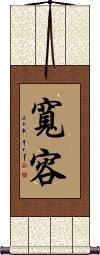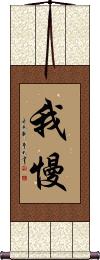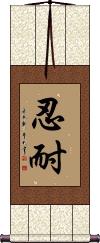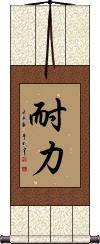Many custom options...
And formats...

Tolerance in Chinese / Japanese...
Buy a Tolerance calligraphy wall scroll here!
Personalize your custom “Tolerance” project by clicking the button next to your favorite “Tolerance” title below...
Tolerance
Being tolerant is accepting differences. You don't expect others to think, look, speak or act just like you. You are free of prejudice, knowing that all people have feelings, needs, hopes, and dreams. Tolerance is also accepting things you wish were different with patience and flexibility.
寬容 can also be translated as magnanimity, generosity, or leniency.
Note: There is a tiny deviation in the first character when written in Japanese. If you choose our Japanese master calligrapher, the little dot on the lower right of the first character will be omitted. With or without the dot, this can be read in Chinese, Japanese, and old Korean.
See Also: Patience
Gaman
Gaman is a Zen Buddhist term from Japan that means “enduring the seemingly unbearable with patience and dignity.”
This title can also be translated as patience, perseverance, tolerance, or self-denial.
我慢 is also a Chinese Buddhist term with a different pronunciation. It comes from Sanskrit abhimāna or ātma-mada. Chinese Buddhism defines this very differently as “Egoism exalting self and depreciating others,” “self-intoxication,” or “pride.” Alone, the first character means “Me, I, or Self,” and the second character in a Buddhist context comes from Sanskrit māna and means pride, arrogance, self-conceit, looking down on others, superciliousness, etc.
I’m currently working with Japanese and Chinese translators to try and reconcile the true meaning or any commonality of this word between languages. For now, please only consider this if your audience is Japanese.
Patience / Perseverance / To Endure / Tolerant
忍耐 is patience, the quiet hope, and trust that things will turn out right.
You wait without complaining. You are tolerant and accepting of difficulties and mistakes. You picture the end in the beginning and persevere to meet your goals.
忍耐 can also mean “to endure,” “restrain oneself,” or “forbearance,” and in some contexts, it can mean “perseverance” or “endurance.”
忍耐 is also used as a tenet of Taekwondo, Tang Soo Do, and other Korean martial arts where it's titled “Endurance” and romanized as “In Neh.”
![]() Note that when writing this as Kanji, Japanese will tend to write the first character in the form shown to the right. If you select our Japanese master calligrapher, please expect this Kanji form (yes,
it’s
just one stroke that is slightly different in location, crossing another stroke in the Japanese Kanji form).
Note that when writing this as Kanji, Japanese will tend to write the first character in the form shown to the right. If you select our Japanese master calligrapher, please expect this Kanji form (yes,
it’s
just one stroke that is slightly different in location, crossing another stroke in the Japanese Kanji form).
See Also: Peace | Harmony | Perseverance
Zhen Shan Ren
Truth Compassion Tolerance
Stamina / Endurance
耐力 means stamina or endurance. However, depending on the context, it can also mean patience or tolerance.
耐力 is the first part of titles like “endurance swimming.”
The first character means “to tolerate” or “to endure.”
The second character is “power.”
Together, you could say this word means “the power to endure.”
This in-stock artwork might be what you are looking for, and ships right away...
Not the results for tolerance that you were looking for?
Below are some entries from our dictionary that may match your tolerance search...
| Characters If shown, 2nd row is Simp. Chinese |
Pronunciation Romanization |
Simple Dictionary Definition |
容赦 see styles |
yousha / yosha ようしゃ |
More info & calligraphy: Forgiveness (from the top down) |
心眼 see styles |
xīn yǎn xin1 yan3 hsin yen shingan しんがん |
More info & calligraphy: Mind’s Eyethe mind's eye The eye of the mind, mental vision. |
忍び see styles |
shinobi しのび |
More info & calligraphy: Shinobi / Ninja Outcast |
量 see styles |
liàng liang4 liang ryou / ryo りょう |
capacity; quantity; amount; to estimate; abbr. for 量詞|量词[liang4 ci2], classifier (in Chinese grammar); measure word (n,n-suf) (1) quantity; amount; volume; capacity; portion (of food); (2) (See 度量・1) generosity; magnanimity; tolerance; (3) pramana (means by which one gains accurate and valid knowledge; in Indian philosophy); (surname, female given name) Ryō pramāṇa. Measure, capacity, length, ability; to measure, deliberate; a syllogism in logic, v. 比量. A syllogism, consisting of 宗 pratijñā, proposition; 因 hetu, reason; 喩 udāharaṇa, example; but the syllogism varies in the number of its avayava, or members. There are other divisions from 2 to 6, e.g. 現量 and 比量 direct or sense inferences, and comparative or logical inferences; to these are added 聖教量 arguments based on authority; 譬喩量 analogy; 義准 postulation, or general assent; and 無體 negation, or non-existence. |
三忍 see styles |
sān rěn san1 ren3 san jen sannin |
The tree forms of kṣānti, i.e. patience (or endurance, tolerance). One of the groups is patience under hatred, under physical hardship, and in pursuit of the faith. Another is patience of the blessed in the Pure Land in understanding the truth they hear, patience in obeying the truth, patience in attaining absolute reality; v. 無量壽經. Another is patience in the joy of remembering Amitābha, patience in meditation on his truth, and patience in constant faith in him. Another is the patience of submission, of faith, and of obedience. |
八忍 see styles |
bā rěn ba1 ren3 pa jen hachinin |
The eight kṣānti, or powers of patient endurance, in the desire-realm and the two realms above it, necessary to acquire the full realization of the truth of the Four Axioms, 四諦; these four give rise to the 四法忍, i.e. 苦, 集, 滅, 道法忍, the endurance or patient pursuit that results in their realization. In the realm of form and the formless, they are called the 四類忍. By patient meditation the 見惑 false or perplexed views will cease, and the八智 eight kinds of jñāna or gnosis be acquired; therefore 智 results from忍 and the sixteen, 八忍八智 (or 觀), are called the 十六心, i.e. the sixteen mental conditions during the stage of 見道, when 惑 illusions or perplexities of view are destroyed. Such is the teaching of the 唯識宗. The 八智 are 苦, 集, 滅,道法智 and 苦, etc. 類智. |
公差 see styles |
gōng chāi gong1 chai1 kung ch`ai kung chai kousa / kosa こうさ |
official errand; bailiff in a yamen (1) {math} common difference; (2) tolerance (in engineering, manufacturing, etc.); allowance; allowable error |
六忍 see styles |
liù rěn liu4 ren3 liu jen rokunin |
six kinds of tolerance |
勘忍 see styles |
kannin かんにん |
(noun/participle) (1) patience; patient endurance; forbearance; tolerance; (2) forgiveness; pardon |
包容 see styles |
bāo róng bao1 rong2 pao jung houyou / hoyo ほうよう |
to pardon; to forgive; to show tolerance; to contain; to hold; inclusive (noun, transitive verb) (1) tolerance; magnanimity; comprehension; (noun, transitive verb) (2) inclusion; encompassing |
器量 see styles |
qì liàng qi4 liang4 ch`i liang chi liang kiryō きりょう |
tolerance (1) looks; features; personal beauty; (2) ability; talent; calibre; caliber; capability; capacity; (3) dignity; credit; estimation Capacity. |
堪忍 see styles |
kān rěn kan1 ren3 k`an jen kan jen kannin かんにん |
(noun/participle) (1) patience; patient endurance; forbearance; tolerance; (2) forgiveness; pardon sahā; to bear, patiently endure. |
大目 see styles |
daime だいめ |
(noun or adjectival noun) (1) (See 大目に見る・おおめにみる) magnanimity; tolerance; (2) (rare) large eyes; (surname) Daime |
寛容 see styles |
kanyou / kanyo かんよう |
(n,adj-na,vs,vt) tolerance; open-mindedness; forbearance; generosity; magnanimity; (personal name) Hiroyasu |
度量 see styles |
dù liàng du4 liang4 tu liang doryou / doryo どりょう |
measure; tolerance; breadth; magnanimity; (math.) metric (1) generosity; magnanimity; tolerance; (2) length and capacity; measures |
心路 see styles |
xīn lù xin1 lu4 hsin lu kokoro こころ |
scheme; artifice; tolerance; intention; motive; train of thought; brains; wit; ideas (female given name) Kokoro The mind-road, i. e. the road to Buddhahood. |
忍力 see styles |
rěn lì ren3 li4 jen li ninriki |
(power of) tolerance |
忍滿 忍满 see styles |
rěn mǎn ren3 man3 jen man ninman |
completion of (perfection of) tolerance |
慈忍 see styles |
cí rěn ci2 ren3 tz`u jen tzu jen jinin じにん |
(personal name) Jinin Compassion and patience, compassionate tolerance. |
氣量 气量 see styles |
qì liàng qi4 liang4 ch`i liang chi liang |
(lit. quantity of spirit); moral character; degree of forbearance; broad-mindedness or otherwise; tolerance; magnanimity |
淨忍 see styles |
jìng rěn jing4 ren3 ching jen jōnin |
pure tolerance |
耐性 see styles |
nài xìng nai4 xing4 nai hsing taisei / taise たいせい |
patience (1) resistance (to heat, corrosion, etc.); tolerance (to a drug, pain, etc.); (2) {med;biol} resistance (to drugs, pesticides, etc.) |
苦忍 see styles |
kǔ rěn ku3 ren3 k`u jen ku jen kunin |
tolerance of suffering |
裕度 see styles |
yù dù yu4 du4 yü tu yuudo / yudo ゆうど |
margin; allowance electrical tolerance |
許容 see styles |
kyoyou / kyoyo きょよう |
(noun, transitive verb) permission; allowance; acceptance; tolerance; pardon |
雅量 see styles |
yǎ liàng ya3 liang4 ya liang garyou / garyo がりょう |
magnanimity; tolerance; high capacity for drinking magnanimity; generosity; tolerance; (given name) Masakazu |
順忍 顺忍 see styles |
shùn rěn shun4 ren3 shun jen junnin じゅんにん |
(given name) Junnin The third of the five bodhisattva stages of endurance, i.e. from the fourth to sixth stage. |
餘量 余量 see styles |
yú liàng yu2 liang4 yü liang |
remnant; leftover; tolerance (i.e. allowed error) |
上忍位 see styles |
shàng rěn wèi shang4 ren3 wei4 shang jen wei jōnin i |
stage of superior tolerance |
下忍位 see styles |
xià rěn wèi xia4 ren3 wei4 hsia jen wei genin i |
stage of lesser tolerance |
Click here for more tolerance results from our dictionary
The following table may be helpful for those studying Chinese or Japanese...
| Title | Characters | Romaji (Romanized Japanese) | Various forms of Romanized Chinese | |
| Tolerance | 寬容 宽容 | kanyou / kanyo | kuān róng kuan1 rong2 kuan rong kuanrong | k`uan jung kuanjung kuan jung |
| Gaman | 我慢 | ga man / gaman | wǒ màn / wo3 man4 / wo man / woman | |
| Patience Perseverance To Endure Tolerant | 忍耐 | nin tai / nintai | rěn nài / ren3 nai4 / ren nai / rennai | jen nai / jennai |
| Zhen Shan Ren | 真善忍 | zhēn shàn rěn zhen1 shan4 ren3 zhen shan ren zhenshanren | chen shan jen chenshanjen |
|
| Stamina Endurance | 耐力 | nài lì / nai4 li4 / nai li / naili | ||
| In some entries above you will see that characters have different versions above and below a line. In these cases, the characters above the line are Traditional Chinese, while the ones below are Simplified Chinese. | ||||
Successful Chinese Character and Japanese Kanji calligraphy searches within the last few hours...









